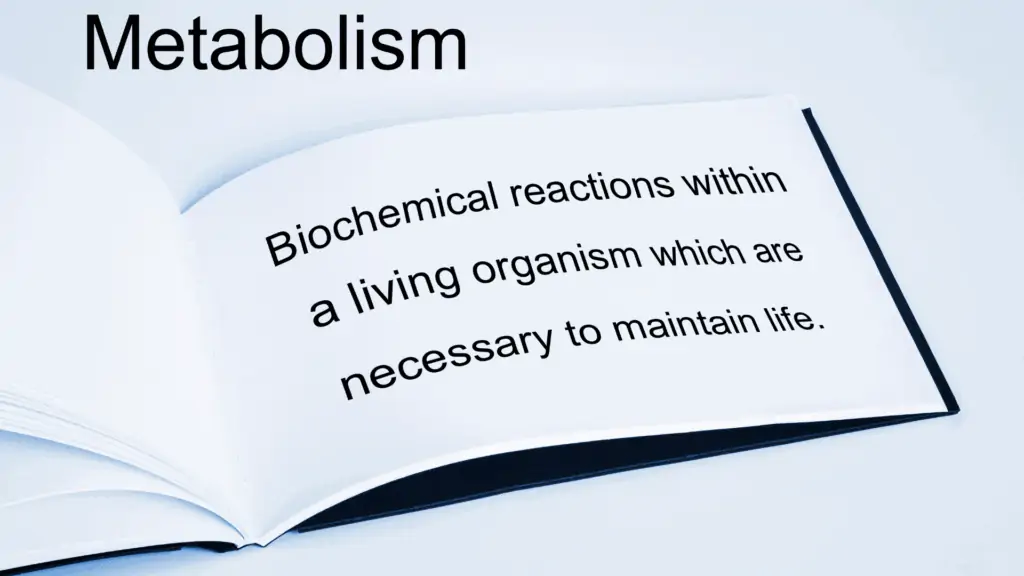Various factors to boost metabolism fall apart when you use them in isolation.
Metabolism is how our body uses energy to conduct chemical reactions that sustain life. It is the rate at which our cells use fuel.
Simply, it is the speed at which your body uses energy and is measured in calories. Metabolism starts slowing down after 40, resulting in weight gain.

Catabolic Metabolism – Your body has a set amount of energy that it needs every day. If you consume less than that amount, your body will begin to break down its tissues to provide the energy it needs. It is known as catabolic metabolism.
Anabolic Metabolism – If you consume more than your body requires, your body will break down fat to provide the extra energy. It is known as anabolic metabolism.
Metabolism plays a vital role in maintaining health. It affects many aspects of our lives, including weight loss, muscle building, fat burning, etc.
Your metabolism is controlled by hormones and enzymes produced by your endocrine glands. Hormones are chemical messengers produced by glands. These glands include the thyroid, pituitary, pancreas, adrenal glands, ovaries, testes, and pineal glands.
Enzymes are proteins that act as catalysts. Hormone levels affect metabolism, and when hormone levels are high, they slow down and speed up when they are low.
How to Increase Metabolism?
If you eat more than what your body needs, it stores the extra calories as fat. If you burn more calories than you consume, your body converts stored fat into energy.
If you want to lose weight and build muscles, increase your metabolism. There are various metabolism-booster foods like protein & mineral-rich foods, spicy foods, chili peppers, beans & legumes, ginger, cacao, etc. These are all homemade metabolism boosters that increase metabolism and burn fat. But these can help increase your metabolism for a few hours only.
Similarly, there are drinks to boost the metabolism, like a cup of coffee or tea. Some chemicals in energy drinks may speed up your metabolism. These are, again, metabolism booster supplements that work for a couple of hours only. They include caffeine, which boosts your body’s energy use. In addition, they include the amino acid taurine. Taurine may help accelerate your metabolism and burn fat. However, for some individuals, these beverages may induce high blood pressure, anxiety, and insomnia.
How fast is my metabolism?
The Harris-Benedict equation may be used to calculate BMR. The BMR is the rate at which your body burns calories to maintain life, typically 50–80 calories per hour (1200–1920 calories per day). You would burn your BMR if you stayed in bed all day (your BMR depends on genetics, muscle mass, and several other factors). (1)
So, you have almost no or little control over your BMR. BMR is more or less what calories you spend during sleep or doing nothing physical. Doing mental jobs is also a non-exercise activity, but the extra calories spent are negligible.

There are three other constituents of Metabolism – NEAT, TEF & EAT.
Components of total daily energy expenditure (TDEE).
- BMR – Basal metabolic rate
- NEAT – Non-exercise activity thermogenesis
- TEF – Thermic effect of food
- EAT – Exercise activity thermogenesis
- REE – Resting energy expenditure
- FREE – Non-resting energy expenditure
What is the most natural way to increase metabolism?
NEAT – Non-Exercise Activity Thermogenesis
NEAT is what you do in the hours when you are not sleeping or exercising. A lot depends on these hours. Whether you are doing sedentary work or physical jobs makes a lot of difference. So, if you are doing a lot of physical activity like a construction worker or a restaurant server, your NEAT is very high, and you have a faster metabolism. But your NEAT is almost nothing if you are doing a desk job. Doing housework, catching a bus, or sweeping floors are examples of NEAT. People purposely walking 5000 or 10000 steps in a day is also part of NEAT.
Even if we subtract 8 hrs of sleep and one hour of exercise, we have the longest time in a day to affect our NEAT, which is almost 15 hours. So it all depends on whether we spend these 15 hrs in a sedentary lifestyle or are active. You may add the following activities to your current lifestyle.
- Standing up for 15 minutes every 45 minutes will burn at least 200 calories daily.
- Sitting on a Swiss ball instead of a chair for 15 minutes every hour burns 200 calories daily. It also strengthens the core while you work.
- Not having lunch on your desk.
- I mean going out for a coffee break (I mean within the office, away from your desk, and not to Starbucks)
- Not having the water bottle on your desk whenever you feel thirsty.
While all these are not suitable for everybody, they indicate what you can do to increase NEAT.
I must mention here that you cannot sustain weight loss unless you increase your NEAT. So, having a long-term active lifestyle is very important.
TEF – Thermic Effect of Food
The body uses more protein calories to digest protein than carbs or fat. 20 to 30% of extra protein calories are utilized to digest protein, whereas only 5 to 10% of extra carb calories are utilized for digesting carbs and 0 to 3% of fat for digesting fat. Keeping the total calorie input the same, having a protein-rich diet is way more beneficial than a carb or fat-rich diet.
Whatever the source of protein, we need to consume at least one gram of protein for every kilogram of body weight.
EAT – Exercise Activity of Thermogenesis
You will notice from the illustration that EAT is the smallest part of the equation, though a very important one. The issue is that exercise alone is not a long-term sustainable method of staying fit with a healthy metabolism unless BMR, TEF, and NEAT are proper.
Doing regular exercise to increase metabolism is also effective. It burns lots of extra calories. A frequently asked question is, which exercise? Any exercise, for that matter, be it Yoga, endurance, balance, flexibility, or strength training. Though a more strenuous exercise like high-intensity interval training will burn more calories, the metabolism may stay raised for even the next 24 hours.
Strength exercise will burn a lot of calories because strength exercise helps in developing muscles. A muscular body burns more calories than an average body or a body high in fat content. It also depends on your current body composition. For example, an obese person will burn fewer calories, whereas a lean muscle will burn more during daily exercise.
How to Boost Metabolism?
Increasing metabolism is the holy grail of Weight Watchers, but it relies on many factors. Some individuals have a fast metabolism. Even while sleeping, males burn more calories than women. And after 40, most people’s metabolism slows down. Metabolism starts slowing down as early as 18 years, but the changes are extremely slow. While you can’t change your age, gender, or genetics, you can increase your metabolism directly or indirectly in various ways. Here are some tips to help you get started:
1. Increase physical activity

It includes walking or running. It would help if you aimed to do 30 minutes 5 times a week. Exercising boosts your metabolism. Intense exercise will burn more calories.
2. Reduce stress
Try meditation or Yoga. Stress causes cortisol to rise. Cortisol reduces metabolic rates.
3. Drink plenty of water
Drinking enough water helps keep your organs functioning properly. Drink 8-10 glasses of water per day. Water intake also flushes toxins from your system. According to modern science, if you drink cold water, the body has to do extra work to bring it to body temperature. Approx 8 calories are spent during this process.
Water is needed to digest calories. Your metabolism may be slow if you are slightly dehydrated. People who drank eight glasses or more water daily burned more calories than those who drank four. Every meal and snack should start with a glass of water or unsweetened liquid. Snack on fresh fruits and veggies instead of pretzels or chips.
4. Avoid processed foods
Avoid eating too much sugar and refined carbs like white bread and pastries.
5. Eat Breakfast
The best time to eat is before any strenuous activities, first thing in the morning. Breakfast is the most important meal of the day. Eating a nutritious breakfast will give you the energy to start your day.
6. Don’t skip meals
Skipping meals makes us feel hungry all the time. We end up overeating later on when we finally have something to eat.
7. Control Alcohol
Would you please not overdo it with alcohol consumption? Alcohol lowers your metabolism.
8. Muscle Up
Even when you’re not moving, your body burns calories. Resistance training is important. Individuals with lean muscle mass have a greater resting metabolic rate. Muscle burns about six calories daily, whereas fat burns just two calories daily. Over time, a slight difference adds up. Muscles throughout your body are engaged after a strength exercise session.
9. Workout Harder
Aerobic exercise doesn’t develop large muscles, but it boosts the metabolism after a workout. The trick is to push. High-intensity exercise raises the resting metabolic rate more than low-or moderate-intensity activity. Try a more strenuous gym class or jog briefly on your average stroll to get the advantages.
10. Snack Wise
Eat more frequently to lose weight. Large meals with long intervals between meals impede metabolism. Eating every 3-4 hours keeps your metabolism going, allowing you to burn more calories throughout the day. Several studies also indicate that frequent snackers eat fewer meals.
11. Spice-Up Your Meals
Spicy meals include natural compounds that may speed up your metabolism. For example, red or green chili peppers may help speed up the metabolism. If you consume spicy meals often, the advantages may accumulate. For example, add red pepper flakes to spaghetti, chili, and stews for a fast boost.
12. Boost Your Protein Intake
Protein digestion consumes more calories than fat or carbohydrate digestion. Therefore, replacing some carbohydrates in your daily diet with lean protein-rich meals may help improve metabolism. Meat, poultry, tofu, and low-fat dairy products are good protein sources.
13. Black Coffee
If you drink coffee, you probably appreciate the boost in energy and focus. In moderation, coffee may provide a short-term metabolic boost. Caffeine may help you feel less tired and improve your workout endurance.
14. Green Tea Recharge
Caffeine and catechins in green or oolong tea work together to boost the metabolism for a few hours. For example, two to four cups of tea may help the body burn 17 percent more calories during brief bouts of moderate-intensity activity.
15. Don’t go on a Crash Diet
People who want to speed up their metabolism should avoid crash diets that include consuming less than 1,200 (or 1,800) calories per day. These diets may help you lose weight in the short run, but they sacrifice nutrients and slow metabolism. It may also cause muscle loss, which results in a further decrease in metabolism. Consequently, your body burns fewer calories and accumulates weight more quickly.
Your BMR is influenced by multiple factors working in combination, including:
- Environmental temperature – if the temperature is very low or very high, the body has to work harder to maintain its normal body temperature, which increases the BMR.
- Infection or illness – BMR increases because the body has to work harder to build new tissues and create an immune response.
- Dietary deficiencies – for example, a diet low in iodine reduces thyroid function and slows the metabolism.
(1) https://www.nbcnews.com/id/wbna3958677
Anil’s infectious enthusiasm and wealth of knowledge make him a natural motivator. Through his guidance and support, Anil has helped countless individuals transform their lives, empowering them to lead more vibrant and fulfilling lives.




